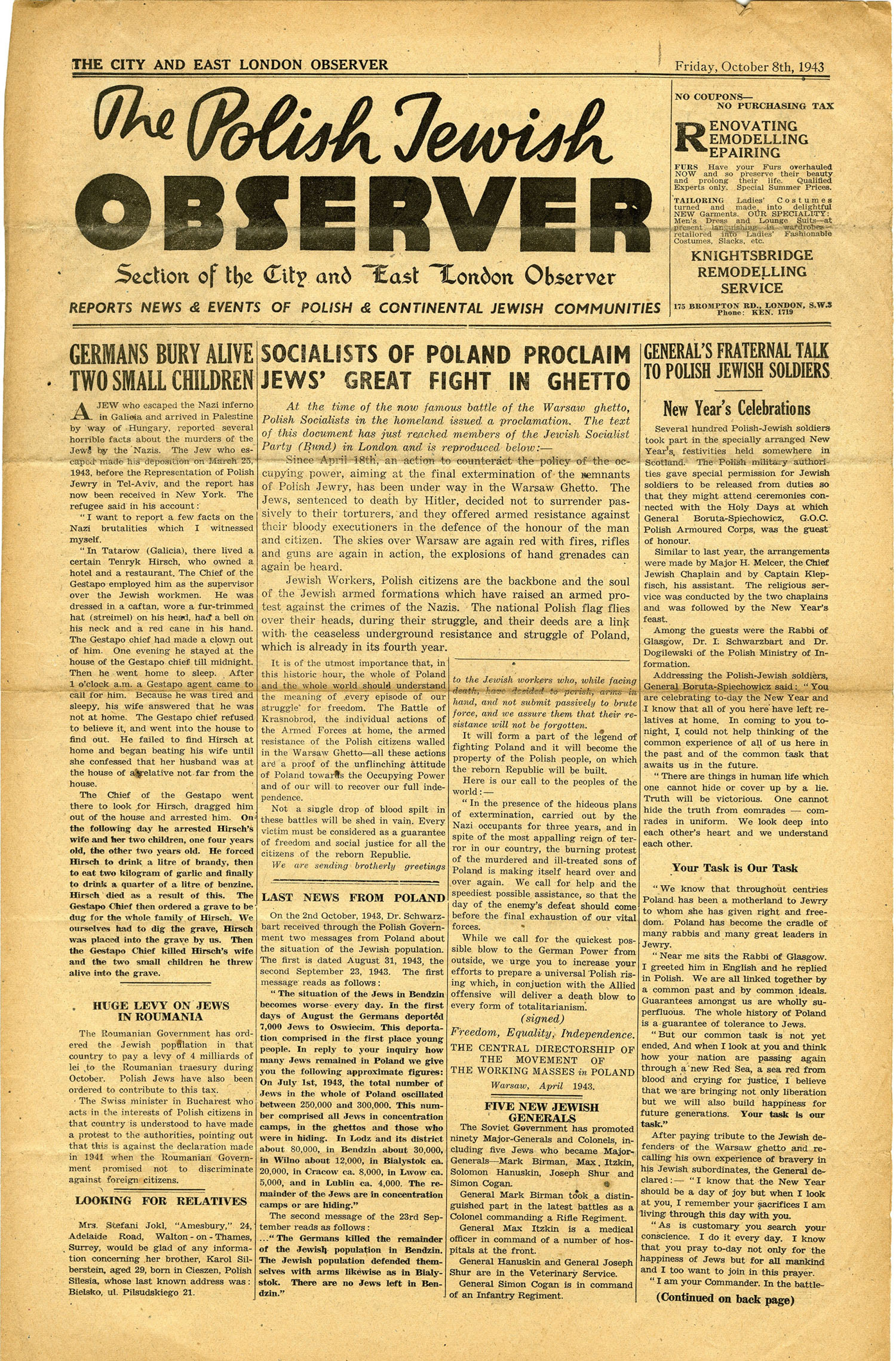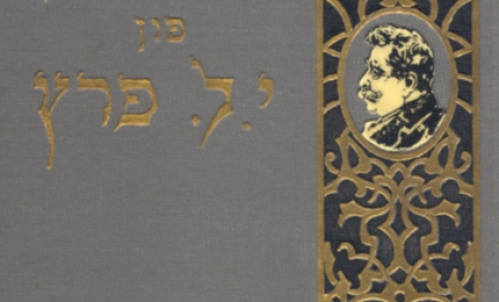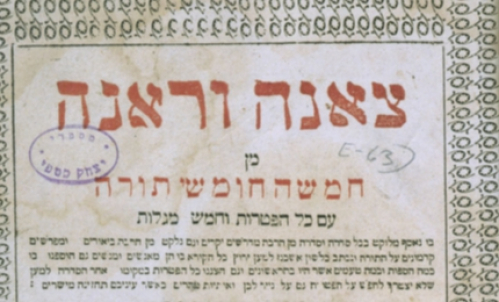The Polish Jewish Observer, later the European Jewish Observer, 1943-45
by JENNIE EAGLE
The Polish Jewish Observer, which was renamed the European Jewish Observer in 1945, was a section of the City and East London Observer published for East European Jews in London during World War II. Its editor, Joel Cang (1897 or 1899-1974), was a journalist and author born near Lublin. He became Warsaw correspondent of the News Chronicle and the Manchester Guardian and in 1927 began to write for the Jewish Chronicle, the major newspaper of the British Jewish community.

Selections from the Polish Jewish Observer, which will be serialized in coming blog posts, represent a window into the (often unfulfilled) hopes and (justifiable) apprehensions of Polish and other European Jews in Great Britain during World War II. The Jews of Britain were trapped between a rock and a hard place.
With the exception of Jews in the German-occupied Channel Islands, Britain’s Jews were spared direct genocidal decimation. In fact, by the immediate postwar period, Britain’s Jewish community of around 345,000-450,000 was the largest of any single European nation outside the USSR. Yet they were still vulnerable. Britain had only grudgingly admitted large numbers of Jewish refugees. After war broke out, Great Britain interned many refugees as “enemy aliens” and consistently blocked means of rescue for their relatives. (The Observer diligently attempted to trace the fates of individual Polish Jews and their families.)
The “assimilated” leaders of the British Jewish community, generally members of families that had been residents in Britain for generations, were fearful of “provoking” antisemitism and tried not to seem “too” Jewish to British gentiles. They did try, without success, to urge the British government to take measures against the Holocaust. (There existed some tension between the leaders of British Jewry and more recent refugees. In the December 24, 1943 issue of the Observer, for example, a Rabbi J. Lainer, of the Federation of Polish Jews in Great Britain, said, “We can no longer rely on those Anglo-Jewish leaders, who have repeatedly on every occasion proved their disinterestedness in our problems.”) Some of these proposed measures - notably, bombing the death camps - were given a great deal of space and coverage in the Observer.
Every issue of the Observer contained descriptions of the progress of the Holocaust, and most also contained a “Polish Corner” devoted to the activities of the Polish government-in-exile and other Poles. The Observer seems mostly to have taken claims of the solidarity of the Polish population as a whole with Jews, and expressions of support for Jews by figures in the Polish government-in-exile and other prominent Poles, at face value. It also, like other media outlets of the time, often lumped the sufferings of Poles and Jews together. This may have been partly because, as a recent book review by the American Association for Polish-Jewish Studies notes, the Observer was among a number of “independent and semi-independent outlets subsidized to a greater or lesser extent by the Polish Government.” It was also because British and US government censorship downplayed the specificity of Jewish suffering; the information available to the Observer was filtered through what Russell Wallis calls a “hierarchy of compassion” in which Christian Europeans were ranked far above Jewish Europeans.
Though the Observer seemed to accept Polish support for the Jewish community, it did not neglect the problem of Polish antisemitism. For example, it critically monitored the activities of the National Democrats (Endecja), the right-wing Polish nationalist movement that before the war had sponsored antisemitic boycotts, demonstrations, and attacks against Jews. The Observer also reported on the antagonism faced by Jewish soldiers in the Polish army, which became so severe that in 1944 some Polish-Jewish soldiers were court-martialed for attempting to transfer to the British army.
The Observer is an exceptionally valuable resource for anyone interested in Jewish refugee networks in Britain and around the world, Polish-Jewish relations, and the development of Holocaust reportage in World War II Britain.
Jennie Eagle is an intern in the YIVO Archives.
- Berghahn, Marion. Continental Englishmen: German-Jewish Refugees from Nazi Germany. New York: Berghahn Books, 2007.
- Bolchover, Richard. British Jewry and the Holocaust. Cambridge: Cambridge University Press, 1993.
- Dwork, Debórah, and Robert Jan van Pelt. Flight from the Reich: Refugee Jews, 1933-1946.
- Fleming, Michael. Auschwitz, the Allies, and Censorship of the Holocaust. Cambridge: Cambridge University Press, 2014.
- “Jewish Soldiers Testify on Anti-semitism in Polish Army; Court-martial Continues.” Jewish Telegraphic Agency, April 20, 1944.
- Philpot, Robert. “‘Don’t mention the Jews’: How wartime BBC failed to issue Holocaust warnings.” The Times of Israel, June 22, 2019.
- “Poland Does Nothing to Check Anti-semitic Drive of the Endeks.” Jewish Telegraphic Agency, August 7, 1934.
- -. Review of Wobec“niespotykanego w dziejach mordu”: Rząd RP na uchodźstwie, Delegatura Rządu RP na Kraj, AK a eksterminacja ludności żydowskiej od ‘wielkiej akcji’ do powstania w getcie warszawskim. Chełm: Biblioteka Rocznika Chełmskiego, 2018.
- London, Louise. Whitehall and the Jews, 1933-1948: British immigration policy, Jewish refugees and the Holocaust. Cambridge: Cambridge University Press, 2000.
- Pedersen, Susan. Eleanor Rathbone and the Politics of Conscience. New Haven and London: Yale University Press, 2004.
- Rubinstein, William D., Hilary L. Rubinstein, and Michael A. Jolles, eds. “Joel Cang.” The Palgrave Dictionary of Anglo-Jewish History. Basingstoke, England: Palgrave Macmillan, 2011.
- Shatzkes, Pamela Joy. “Anglo-Jewish Relief and Rescue Efforts, 1938-44.” Ph.D thesis, London School of Economics and Political Science, 1999.
- Wallis, Russell. Britain, Germany, and the Road to the Holocaust: British Attitudes towards Nazi Atrocities. London and New York: I.B. Tauris, 2014.

